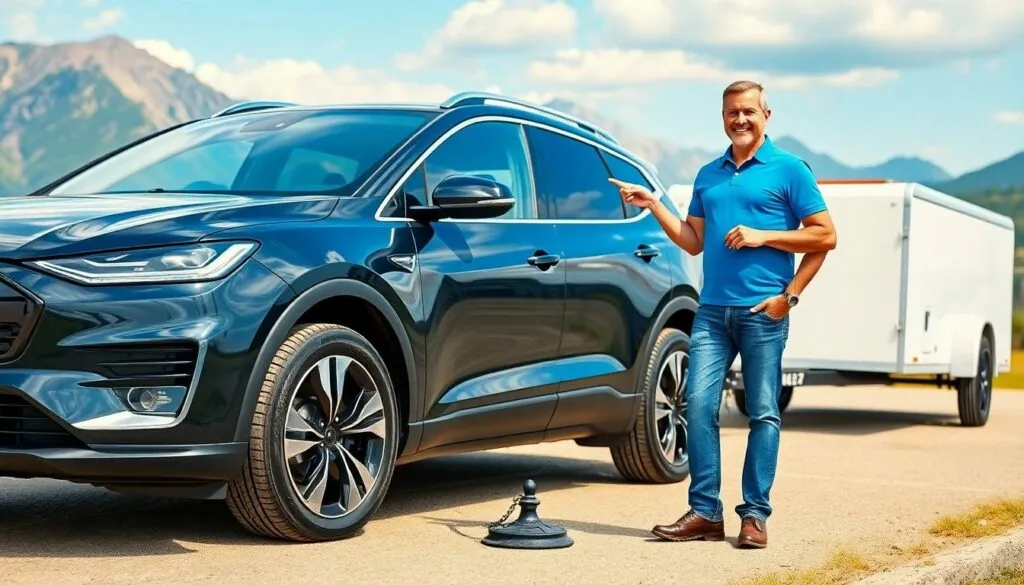Table of Contents
ToggleTowing electric vehicles might sound like a scene straight out of a sci-fi movie, but it’s becoming an everyday reality. As more drivers embrace the electric revolution, the need for effective towing solutions is crucial. Imagine being stranded with a dead battery and no gas station in sight. It’s not just inconvenient; it’s downright shocking.
Understanding Towing Electric Vehicles
Towing electric vehicles presents unique challenges and benefits as their popularity rises. Understanding these aspects is essential for drivers in the evolving electric ecosystem.
Benefits of Towing Capabilities
Towing capabilities enhance the usability of electric vehicles. Increased towing capacity allows EVs to transport trailers and heavy loads, making them versatile for various activities. Enhanced range often comes with newer models, enabling drivers to travel longer distances while towing. Electric vehicles can deliver instant torque, improving acceleration and making towing smoother. Additionally, many electric towing systems have built-in features that simplify trailer assistance, like integrated cameras and smart sensors, ensuring safer towing experiences.
Limitations to Consider
Limitations exist when towing electric vehicles. Reduced battery range occurs when towing heavy loads, potentially leaving drivers stranded farther from charging stations. Weight distribution and aerodynamics affect efficiency, leading to increased energy consumption. Compatibility with existing towing equipment can also pose challenges; not all traditional towing accessories are suitable for electric models. Battery thermal management becomes crucial as towing can generate heat, impacting battery performance and longevity. Understanding these limitations enables drivers to make informed decisions.
Key Features of Towing Electric Vehicles

Towing electric vehicles presents unique features that enhance their functionality. Understanding battery capacity and weight distribution is crucial for drivers.
Battery Capacity
Battery capacity directly impacts towing performance. When towing heavy loads, energy demand increases significantly. Drivers may experience a notable reduction in battery range, requiring careful planning for longer trips. Most modern EVs come equipped with powerful battery systems that support towing, yet limitations exist. For instance, manufacturers often specify towing limits to prevent excessive strain on batteries. Knowing the vehicle’s maximum capacity ensures safety and efficiency while towing. Optimal performance comes from understanding how weight affects battery usage, allowing drivers to make informed decisions.
Weight Distribution
Weight distribution plays an essential role in towing stability. Uneven weight can lead to handling issues on the road. Recognizing how to distribute weight evenly across the trailer reduces stress on the towing vehicle. Many electric vehicles offer advanced towing capabilities designed to maintain balance. Properly distributing weight reduces the likelihood of swaying or fishtailing during travel. Drivers must adhere to best practices, ensuring that heavy items are positioned low and centered within the trailer. Engaging in these practices prevents accidents and promotes safe towing experiences.
Choosing the Right Tow Vehicle
Selecting an appropriate tow vehicle is crucial for effective towing of electric vehicles (EVs). Assessing the towing capacity is the first step; each EV has specific towing limits that must not be exceeded. Knowing the vehicle’s Gross Vehicle Weight Rating (GVWR) helps ensure it can handle the added weight of trailers or cargo.
Understanding battery capacity is also essential. Reduced battery range occurs when towing, particularly with heavier loads. Those interested in towing should review their EV’s specifications, including energy consumption while towing, to make informed decisions.
Evaluating weight distribution plays a significant role in towing safety. Improperly balanced loads can lead to stability issues, impacting handling and braking performance. Ensuring even weight distribution across the axle can improve towing performance and safety.
Compatibility with towing equipment is another aspect to consider. Devices such as hitches and connectors must match the size and weight capacity of both the tow vehicle and the electric vehicle being towed. Manufacturers often provide recommended equipment to ensure optimal safety and performance during towing.
Looking into additional features enhances the towing experience. Some newer EV models come equipped with towing packages, which include enhanced cooling systems and improved suspension. These features can support more stable and efficient towing.
Ultimately, choosing the right tow vehicle involves understanding the combined factors of capacity, distribution, equipment compatibility, and additional enhancements. A well-considered choice leads to safer and more efficient towing experiences with electric vehicles.
Best Electric Vehicles for Towing
Several electric vehicles excel in towing capacities, making them suitable for diverse needs.
- Ford F-150 Lightning
This electric truck boasts a towing capacity of up to 10,000 pounds, making it ideal for hauling heavy trailers. Its robust battery ensures ample range during towing activities.
- Rivian R1T
With a towing capacity of 11,000 pounds, the Rivian R1T stands out for its performance. Instant torque delivers impressive acceleration, enhancing towing efficiency.
- Tesla Model X
Capable of towing up to 5,000 pounds, this SUV provides ample space and comfort. Its advanced battery technology mitigates range reduction while towing, making it a practical choice.
- Chevrolet Silverado EV
The Silverado EV features a substantial towing capacity of 10,000 pounds. Its well-designed architecture supports stable towing, ensuring a safe experience on the road.
- GMC Hummer EV
This electric vehicle offers a maximum towing capacity of 7,500 pounds. Besides its impressive capabilities, its innovative features enhance towing performance significantly.
- Hyundai Ioniq 5
While it has a lower towing capacity of 2,000 pounds, the Ioniq 5 provides excellent maneuverability. This compact EV suits lighter loads and functions well in urban settings.
- Volkswagen ID.4
The ID.4 can tow up to 2,700 pounds. Its balance of range and performance with towing capabilities makes it a practical option for everyday use.
These electric vehicles provide diverse choices for those seeking effective towing solutions, addressing various needs while ensuring efficiency and reliability.
As the electric vehicle market continues to expand drivers must stay informed about the unique challenges and advantages of towing. Understanding towing capacity battery range and weight distribution is crucial for safe and efficient towing experiences. With the right knowledge and preparation drivers can confidently navigate the demands of towing electric vehicles while enjoying the benefits of modern technology. Selecting the appropriate EV for towing needs not only enhances usability but also promotes a seamless transition into the electric future. Embracing these insights ensures that towing electric vehicles remains a practical and effective solution for diverse lifestyles.




